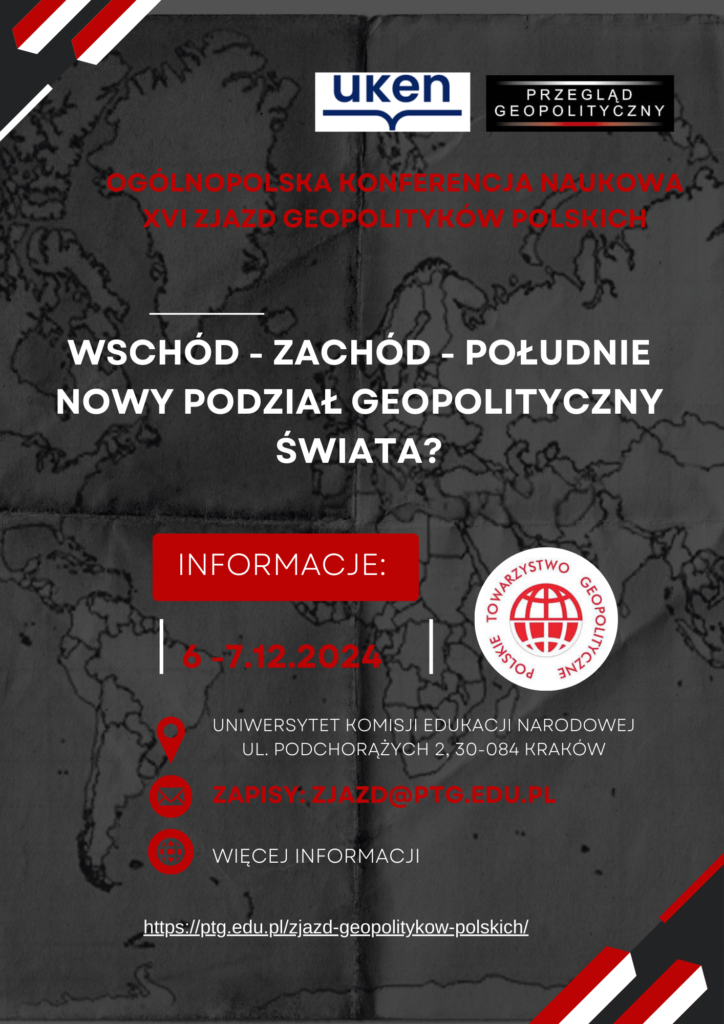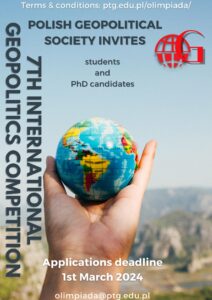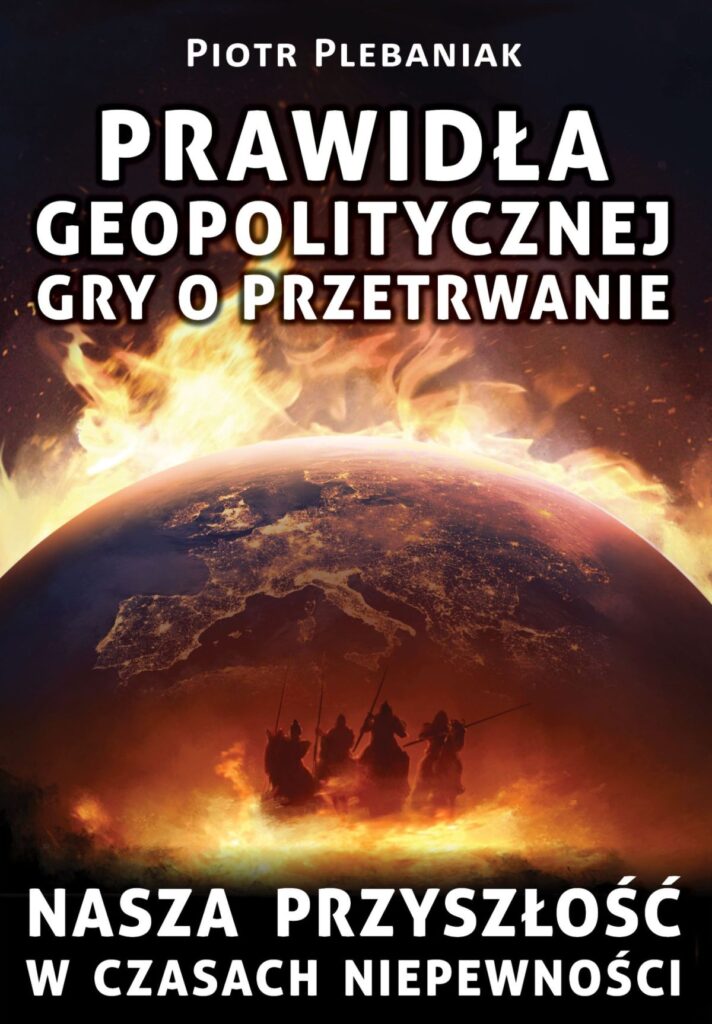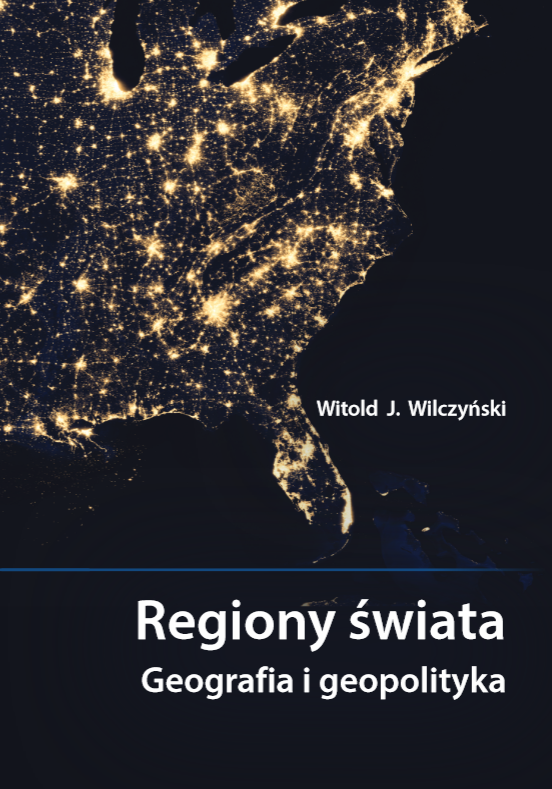International Competition in Geopolitics
POLISH GEOPOLITICAL SOCIETY

invites all students interested in geopolitics to take part in our yearly international competition
THE INTERNATIONAL COMPETITION IN GEOPOLITICS
AIM
The aim of the event is to find out the best and most ambitious students in a field of geopolitics, and reward them with an opportunity to integrate, discuss, get known to scholars and other best students, as well as reward them with honourable titles and valuable prizes.
LANGUAGE
The languages of international competition are Polish and English, with both language tests versions same in meaning and difficulty.
COMPETITORS
To take part in the competition you have to be a person, which doesn’t hold PhD at the moment of signing in. Students of each educational level are invited, highschool, bechelor, masters and PhD students. For person below 18 y.o. parent or another legal guardian agreement will be required. Competitors may represent their school/university or start individually.
PARTICIPATION REQUIREMENTS
– you need to fill in this form and send it to organizers: olimpiada@ptg.edu.pl
– you don’t need to pay an organizing fee (100PLN) for Polish Geopolitical Society (as you will have to cover your trip higher costs if you will be in III stage).
– all above have to be filled in before March, 1st.
– having a doctorate abolish participation or being more than 30 years old, but all PhDs still can cooperate with PTG as an organizers
The participation will be confirmed by email and on a list of participants on the Competition web page: https://ptg.edu.pl/olimpiada/
THE RULES
IGC Statute contains the rules of the Competition written in English, and it concerns also all participants from abroad. It is the same for Polish participants. Language of the Competition is English as well as Polish. A summary of rules for participants are shown below:
1) There are 3 stages of the Competition (see section below).
2) All participants or their sponsors cover all costs of their participation.
3) There are three offices in the Competition: the Organizing Committee, the International Professors Board, the Revising Commission. The Organizing Committee is established by PTG chairman and has organizing and marketing role, and supervises all activities conducted during Competition, like preparation of tests, checking them, etc. The Committee can disqualify participants if they would cheat during tests.
The International Professors Board have advisory role, as well as conducting jury role during final stage. They review essays and quality of prepared test questions. Additionally they promote the Competition in an international academic world. The Revising Commission is a body responsible for all appeals when there are reservations regarding the course of the competition. Then they judge the case.
4) There are two types of prizes for participants if they would manage to get them. First type are guaranteed by PTG, and second by all sponsors. Information about them you will find below.
5) Geopolitics is a broad spectrum of knowledge, so this rules contains what participans should be familiar with, and what wouldn’t be taken into tests. List of disciplines and literature is below.
6) The rule is that all participants can bring their books and notes freely to write a tests. All papers are allowed, but using the Internet or mobile devices is forbidden, as well any cooperation with other participants, except practical part of III stage or team qualifications during II stage.
STAGE I
After completion of participant list Organizing Comittee gives time required for I stage (qualifiers). The aim of the I stage is only to eliminate all low skills participants. Following numerous of participant categories don’t have to take part in stage I duty. Consequently, these are participants who pass into stage II if they prove their right to do it:
– sole authors of reviewed scholarly books or articles in scientific peer-reviewed journals in a field covered by this competition. (To prove, you need to send a pdf or scan of a paper).
– officers and N. C. O.s of active military, police and other armed public service branches as well as students of military schools with active military service ongoing. (To prove, you need to send a proper document scan).
– participants of previous editions III stages.
– members of PTG with 2 recent years activity in PTG (They are allowed to pass on a decision made by PTG chairman).
– others, especially foreigners and those who added some value to the competition (more participants or sponsors or fame for example), which are allowed to pass I stage due to PTG chairman privilege to pass them.
If participant cannot fulfill the above requirements to pass this stage, he/she have to take part in it.
To pass stage I participants should write an essay (10-12 pages) on contemporary geopolitical events (such as political events, battles, border disputes, new conflicts etc). It has to be send on olimpiada@ptg.edu.pl before 1st of May, and be prepared according to these marking highlights:
A) Editing skills markings (0-10 points to gain, or disqualification due to cardinal errors or plagiarism):
volume – 10-20 pages; correct language; short summary and 5 key words in English at the end; editorial format: Garamond – 12pt, citations: same format as in Przeglad Geopolityczny; maps or pictures added if needed; bibliography at the end (same standard like in above journal); note about the author should be included as well.
B) Essential markings (from -40 to 30 points to gain – positive point value allow participant to pass to II stage):
original subject choosen (up to 3 pts); text fulfill the subject (1 pt); subject is of those from the Competition disciplines list (1 pt); essay composition (3 pts); quality of analysis and choosen methods (4 pts); according to theory (3 pts); choosen statistics and statistical methods (2 pt); quality of conclusions (4 pt); choosen literature support (3 pts); narriation skills (1 pt); scientific discipline of the words (1 pt); original (primal) sources quality (2 pts); computing skills use (1 pt); graphics (1 pt).
An essay is marked by 2 reviewers (double peer-review), and result is an average points from those two independent reviewers. Best essays are granted to be published for free in scientific journals of PTG: Geopolitical Review or European Journal of Geopolitics!
STAGE II
Stage II is conducted online via e-mail.
II stage first phase is a test which duration is 60 minutes. During the test a participant is able to use all sources except support from others. Test is composed of 60 questions with 6 possible answers and only of which 1 is true, so to answer a question you have to mark a proper box with letters A-F. Questions and answers are shown in both – Polish and English. You can gain 1 point if marked is true answer, 0 points if there is no answer, or -1 point if there is wrong answer. II stage begins at the same time in all places, and questions are the same everywhere. Results appears on our web page.
The second part of the II stage is a geography and military quiz. Participants receive 20 fragments of maps of strategically important places and 20 photography fragments. Their task is to recognize these places and military equipment during a time limit.
The third part is called the geopolitical duel. Participants create 6 questions from the European Journal of Geopolitics and the Geopolitics Review or other open-source literature (accepted by the jury), which they ask the selected opponent and also receive 6 questions from him. They have 24 hours to answer and prepare it in a short written form. The jury evaluates the answers and awards points and the right to another match to the one who has answered more questions. 64 competitors take part in the first series, 32 drop out after the first and receive as many additional points in the second stage as many questions are answered. The 32 participants then work on another 6 questions (may be the same as before). From this, 16 participants drop out and receive as many points as they received for 1 and 2 series of questions. For subsequent series, regardless of the number of answers, additional 2 points are awarded. 16 participants enter the third series, prepare 6 questions again, then 8, 4 and 2. Their points are added up with the test result. The winner gets an additional 5 points instead of 2 for the last match.
20 best participants gain access to the III stage.
STAGE III
Stage III is arranged a day before the main annual meeting of PTG which takes place in different cities of Poland every first weekend of December each year. Only 20 participants pass to this final stage. This stage is conducted through three parts: spoken, written and practical tests.
Part I – written test: the rules are the same as in II stage, but questions are not so easy.
Part II – spoken test: participants awnser choosen questions from list and have to formulate solely proper anwsers. After 3 rounds of questions, participants can attack others by choosing opponents to ask to eliminate them. Points are awarded to those 20 participants who will survive 3 question rounds and who will not be eliminated longer during competition. Progress in this part will be shown on a map. In this part it is possible for participants to cooperate with others to eliminate opponents. Aim is to gather biggest territory on a map by eliminating neigbours using higher skills during awnsering the questions. Game ends if participants cannot awnser 3 questions, loose all territory or all questions prepared for the stage will be given out.
Part III – practical test: participants play strategic game prepared by Organizing Committee using their geostrategic knowledge and may form alliances to fullfil random goals they choose. Awarded is surviving and battle objective fullfilments on operational level.
Between three parts there are around 1 hour brakes.
Who is the winner it is decided on a combined results of these three parts, where participants can gain from 0-10 points each. It is counted 10 pts for a person who wins a part and 9, 8, 7… for next, so 10/20 participants gains points from each part. Maximum is 30 points. Sum of points gives access to prizes. All parts might be filmed.
All results are publicly announced next day during opening celebration of Congress of Polish Geopoliticians. All prizes are awarded then.
PRIZES
Mandatory prizes:
– In stage I best essays are awarded by publishing them for free in PTG journals: Geopolitical Review or European Journal of Geopolitics.
– In stage II 20 best participants get free access to Polish Geopolitical Society annual congress, so all conference materials are given and a right and attend conference with a own prepared presentation and publish them afterwards without fee.
– In stage III 3 best participants gain title of the winner, and the rest of them gain the title of finalist, which are certified and can be put into personal CVs. There is an optional prizes granted by PTG which values depends on number of participants. PTG grants also official honourable prize, which is a millitary ribbon in three colours (bronze, silver, gold). It can be worn on military uniforms. Golden ribbon is awarded for 3 winners. Silver for finalists which gained overall 10 pts and more in the III stage. Bronze are for those participants who gained more than 3 pts. There are also 3 other classes of ribbons for organizers. Winners gain right to have an interview and a meeting with a choosen professor present at a Congress.
Other prizes:
All participants has access to other prizes funded by sponsors and partners of Polish Geopolitical Society which vary in each year.
DISCIPLINES AND LITERATURE
Geopolitics is a broad interdisciplinary science, so we have choosen subdisciplines of geopolitics in which we focus and prepare tests. No other part of geopolitics or scholarly literature will be taken into tests:
Questions may concern:
academic geopolitics, political science, political geography, international relations, military science and security studies… with special focus on:
– definition of geopolitics
– history of academic geopolitics
– geostrategy
– geoeconomy
– classics of geopolitics and their theories
– geopolitical concepts during the Cold War
– geopolitics of eastern Europe
– global hegemony issue
– armed forces of the world
– military tactics and sciences
– military geography
– political geography, states of the world
– regional geopolitics of different parts of the world
– contemporary geopolitics of main powers
– geopolitical codes
– scientific methods in geopolitics and geostrategy
– strategic raw materials and energy sources
– arms and military industry
– military strategies
– intelligence and counterintelligence activities and role of propaganda
– geopolitical analysis and scenario making
On a basic literature we propose:
Geographical atlases, as well proffesional scholarly articles in our journals Przegląd Geopolityczny and European Journal of Geopolitics.
Classic handbooks should be obligatory:
by Colin Flint, John Collins, Samuel Huntington, Henry Kissinger, and so on.
TIMETABLE
1st January- 1st March: participants‘ notification
2nd March- 6th March: verification of applications and eligibility for direct promotion to Stage II
7th March: announcement and publication of the list of participants
7th March- 30th April: Stage I of the IGC
30th April : deadline for submitting essays
10th May : announcement of the results of Stage I and information about the date and time of the Stage II test.
1st June-12th July: Stage II of the IGC
The first Saturday of June – district competition (written test) of the IGC stage II
10th June : public announcement of the results of Stage II test and the list of participants qualified to the next parts
20th June: Stage II quiz
28th June: Stage II quiz results
3rd July: deadline for submitting proposals for questions for the geopolitical duels of the second stage and for the acceptance of questions by the jury
5th July: the start of the geopolitical duels of the Stage II
12th of July: announcement of the list of finalists and the results of the Stage II
1st December-8th December: Stage III of the IGC
First Saturday of December: final competition – The Stage III.
Sunday after the final competition: public announcement of laureates and presentation of awards at the Congress of Polish Geopoliticians.
End of the IGC.










